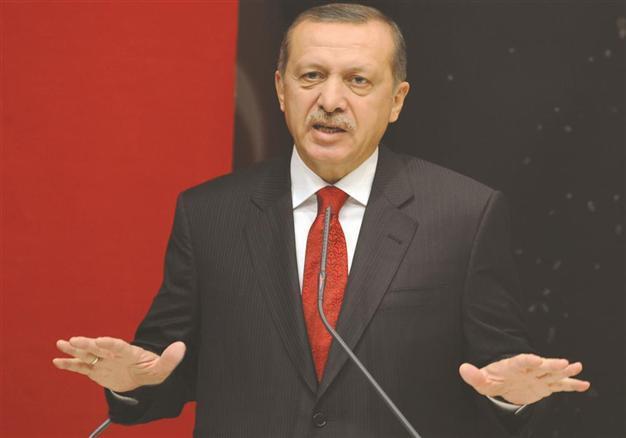Turkish PM Erdoğan to unveil earnest ‘democracy package’
ANKARA - Hürriyet Daily News

Prime Minister Recep Tayyip Erdoğan is set to announce the highly anticipated 'democratization package.' DAILY NEWS photo, Selahattin SÖNMEZ
A highly anticipated “democratization package” that has elicited soaring expectations on the part of Kurds, Alevis, Roma and non-Muslim minorities will be announced today by Prime Minister Recep Tayyip Erdoğan.
The package is deemed as the “continuation of a silent revolution” by party officials, with repercussions expected on both the local and international level. The package will be announced with a large press conference in Ankara and will be translated into English and Arabic. Although government officials have dismissed any link between the package and the ongoing Kurdish resolution process, the reaction of Kurds to the package will have a particular importance, since the package was evaluated as a potential milestone in the peace process launched last year in an effort to end the three-decade-old conflict.
Abdullah Öcalan, the imprisoned leader of the outlawed Kurdistan Workers’ Party (PKK) , will watch the announcement live from İmralı, where he is held captive, while members of the Kurdish Communities Union (KCK) and some deputies from the Peace and Democracy Party (BDP) will tune in from the Kandil headquarters of the PKK in northern Iraq.
However, the leaks about the contents of the package have failed to satisfy the Kurdish front, with BDP co-chair Gültan Kışanak voicing pessimism as recently as the weekend.
Package to focus on Kurds the mostThere are a number of points that have been attracting attention either for their expected inclusion or non-inclusion in the package:
*The package is not expected to include mother-tongue education, a critical demand of Kurds. However, a flexible model in which private schools, instead of state schools, will provide Kurdish and Arabic as elective courses to students upon demand. There will be a minimum number of students required to open a course.
*Another critical aspect of the package is expected to allow the use of letters that were banned from use in the Turkish alphabet by the 1928 Law on Acceptance and Application of Turkish Letters, which came into force in 1930. Letters such as “q,” “w” and “x” – which are used in Kurdish – will now be allowed in education and public services, meaning it will no longer be possible to press charges against those using these letters.
*Names of locations that were changed after the Sept. 12, 1980, coup will be given back their former names, while famous place names could also be changed in line with residents’ wishes. Thus, Tunceli will become Dersim again, Aydınlar in Siirt will be Tillo, while Güroymak will revert to Norşin.
*Amendments will be introduced to the Turkish Criminal Code (TCK) and Anti-Terror Law (TMK) for those who are not under probe instead of those who are not “involved in a crime.” The article is expected to be important for journalists under custody.
*The criteria for political parties to receive Treasury funds will also be amended, but the BDP, which was not allowed to receive aid despite being present in Parliament, will still not be entitled to a sum. Only parties who score in excess of 3 or 5 percent will be entitled to these funds.
*Political parties will be able to campaign in languages other than Turkish, not only during election period as allowed by the Political Parties Law of 2010, but in other party activities and campaign materials as well.
*The Gendarmerie General Directorate will no longer report to the General Staff, but will be made equal in the hierarchy with the Police Department before the Interior Ministry and be turned into a civilian structure that acts as a security force.
Other changes will include providing translations for public services and creating a Security Forces Supervision Commission so that torture and maltreatment will not go unpunished.
Headscarves in public services, Alevi processA regulation introduced during the Sept. 12 process regarding dress code will be abolished so that women with headscarves will be allowed to provide public services. Men will also be granted more flexibility in their dress code and the permission to grow beards.
Some changes are also expected in the Political Parties Law on the article governing the ban on exploiting religion and demonstrating for religious causes.
On another note, cemevis, the house of worship for Alevis, will be allocated financial aid by public bodies and will be recognized as foundations that work for the welfare of the public. Cemevis will also be able to collect donations and pay wages to their employees.
Minorities’ issuesThe Halki Seminary of the Ecumenical Patriarchate is expected to be reopened after 42 years, which was shut due to a “reciprocity” condition set between Turkey and Greece. Similarly, land belonging to Syrian Mor Gabriel Monastery will be returned.
The citizenship demands of minorities who were born in Turkey but live abroad will be taken into consideration. However, those who left the country due to population exchanges between two countries will not be included in this.
